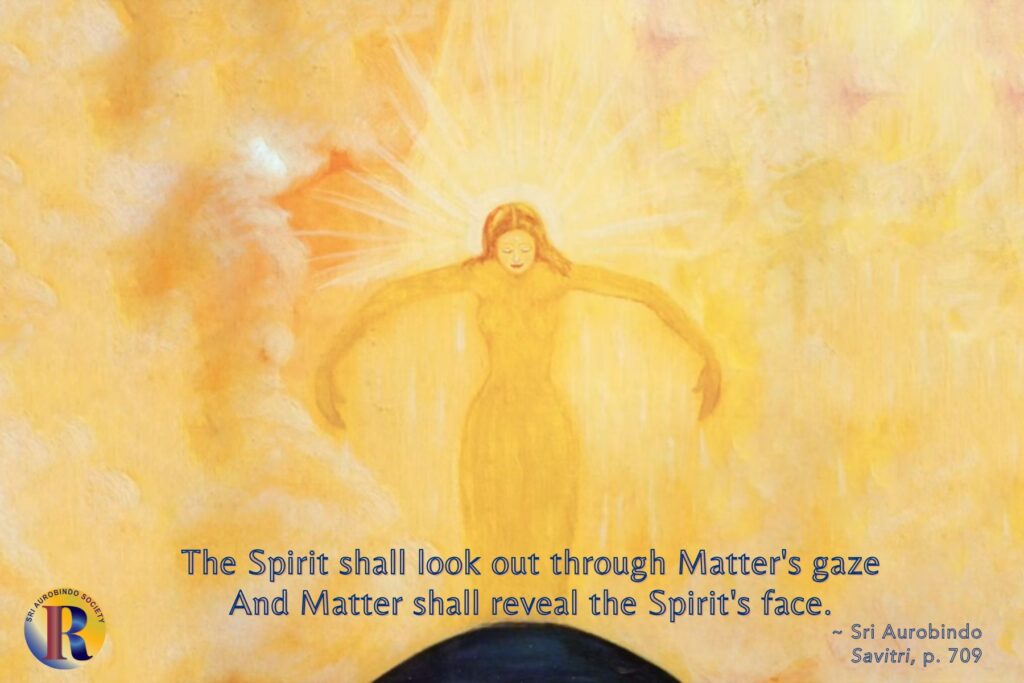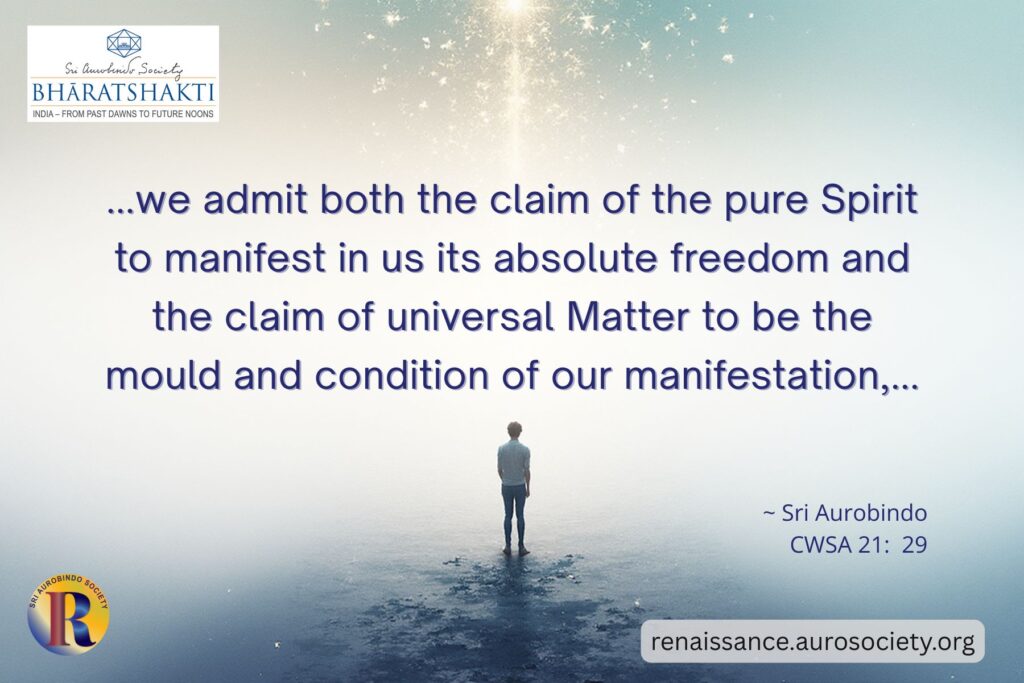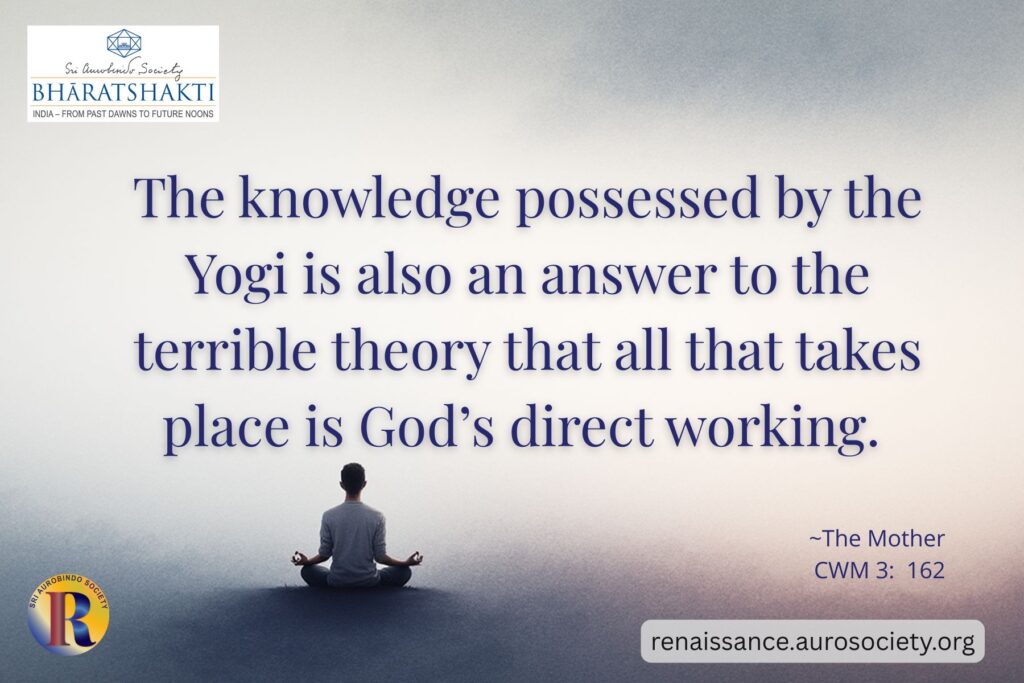Volume III, Issue 10
Author: Narendra Murty
Continued from PART 1

Any description of Sri Aurobindo’s writings would remain incomplete if a mention is not made about Savitri. How do we deal with it? How to understand it? Is it possible to understand it?
Literally speaking, Savitri can be categorized as epic poetry. But it is not poetry in the ordinary sense at all. For Sri Aurobindo himself has said:
Savitri has not been regarded by me as a poem to be written and finished, but as a field of experimentation to see how far poetry could be written from one’s own Yogic consciousness and how that could be made creative.
~ CWSA, Vol. 27, p. 272
Sri Aurobindo was a poet par excellence as can be seen from his collection of more than two hundred poems under the volume Collected Poems where he has written poems of every sort – short poems, lyrical poems, sonnets, narrative poems and even some satirical poems.
His first poem was published when he was only eleven years old! And he kept on writing poetry throughout his life. But Savitri stands apart. If Savitri can be defined in literal terms at all, we may call it mystical-spiritual poetry.
Sri Aurobindo has attempted to express various levels of his Sadhana and his spiritual attainments using the poetic language of Savitri. He worked on Savitri for about thirty-five years of his life and kept on rewriting and revising it. When asked by one of his disciples why he needed to revise his own writing, Sri Aurobindo replied:
I used Savitri as a means of ascension. I began with it on a certain mental level, each time I could reach a higher level I rewrote from that level. Moreover I was particular—if part seemed to me to come from any lower level, I was not satisfied to leave it because it was good poetry. All had to be as far as possible of the same mint.
~ CWSA, Vol. 27, p. 272
So this much is clear that Savitri is not an ordinary epic poem like the Iliad or the Odyssey.
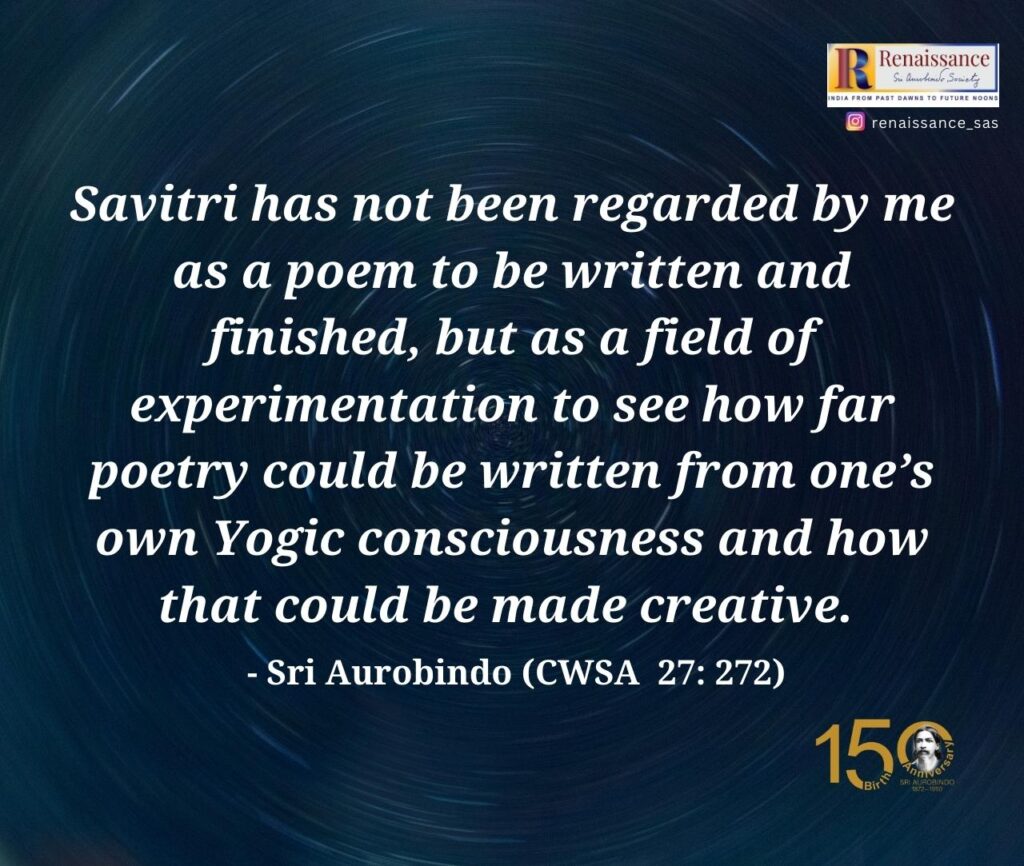
In my personal opinion, Savitri is the highest peak in the history of mystical and spiritual literature in the world. And I am saying this after reading Milton’s Paradise Lost, John Bunyan’s The Pilgrim’s Progress and Dante’s Divine Comedy. I would call them inspired poetry with a few glimpses of the higher dimension. But they nowhere capture the rarefied heights of Yogic experience that Sri Aurobindo expresses in Savitri.
Savitri also happens to be one of the longest poems in the English language and is more than the combined length of the Iliad and the Odyssey. It is not an easy work to read. It is much more difficult than the other great prose writings of Sri Aurobindo such as The Synthesis of Yoga or the The Life Divine.
Regarding the difficulty of understanding Savitri, Sri Aurobindo has himself said:
Savitri stands as a new mystical poetry with a new vision and expression of things, we should expect, at least at first, a widespread, perhaps, a general failure even in lovers of poetry to understand it or appreciate; even those who have some mystical turn or spiritual experience are likely to pass it by if it is a different turn from theirs or outside their range of experience.
~ CWSA, Vol, 27, p. 355
Not very encouraging, I must admit. But Adi Sankara says in the Vivekachudamani that there are three great blessings which we can receive only by the Grace of God: the human birth, desire for liberation and the guidance of the great sages.
If indeed we are blessed in this manner, are we to remain deprived of the nectar of wisdom that Savitri has to offer? How do we make the effort and how to make a beginning with Savitri?
You came to earth to learn to know yourself.
Read Sri Aurobindo’s books and look carefully within yourself as deeply as you can.
~ The Mother, CWM, Vol. 12, p. 204
Here I can only describe to you the path I took without making the claim that it is the only way forward. For when Gurukripa works on a person, he is shown the path directly by the Guru and there can be no fixed formulas in this regard.
The path I suggest would be this. I must add that this is based on my experience; I am not recommending it as a general path to be followed by all.
Firstly, acquire the taste for reading poetry.
Many people are unable to absorb poetry. Poems of any length make them go blank. Reading and appreciating poetry is an entirely different kind of ability compared to reading prose. I started reading and appreciating poetry only when I was into my forties. I soon learned that poetry is all about ‘reading between the lines,’ and understanding the language of symbolism. Much is said in a small space and poetry fires the imagination in no way prose can.
Initially you may start with poets like TS Eliot, WB Yeats, Shelley, Tagore’s Gitanjali, Wordsworth and Rumi. You should also not miss Edwin Arnold’s The Light of Asia about Buddha’s life and The Song Celestial which is a poetic rendering of the Bhagavad Gita. See how you are able to absorb them.
Once you are comfortable with reading poetry, you may next attempt to read epic poetry. Start with the Iliad and the Odyssey of Homer. And the Aenead of Virgil. These epic poems do not contain any spiritual or mystical elements; perhaps only some amount of philosophy and inspiration, and mythological symbolism.
Thereafter you could try Goethe’s Faust and Chaucer’s The Canterbury Tales. Once you have reached this stage, then you may take the next leap to Milton’s Paradise Lost and Dante’s Divine Comedy. In contrast to the others, both these epic poems have theological and spiritual elements in them.
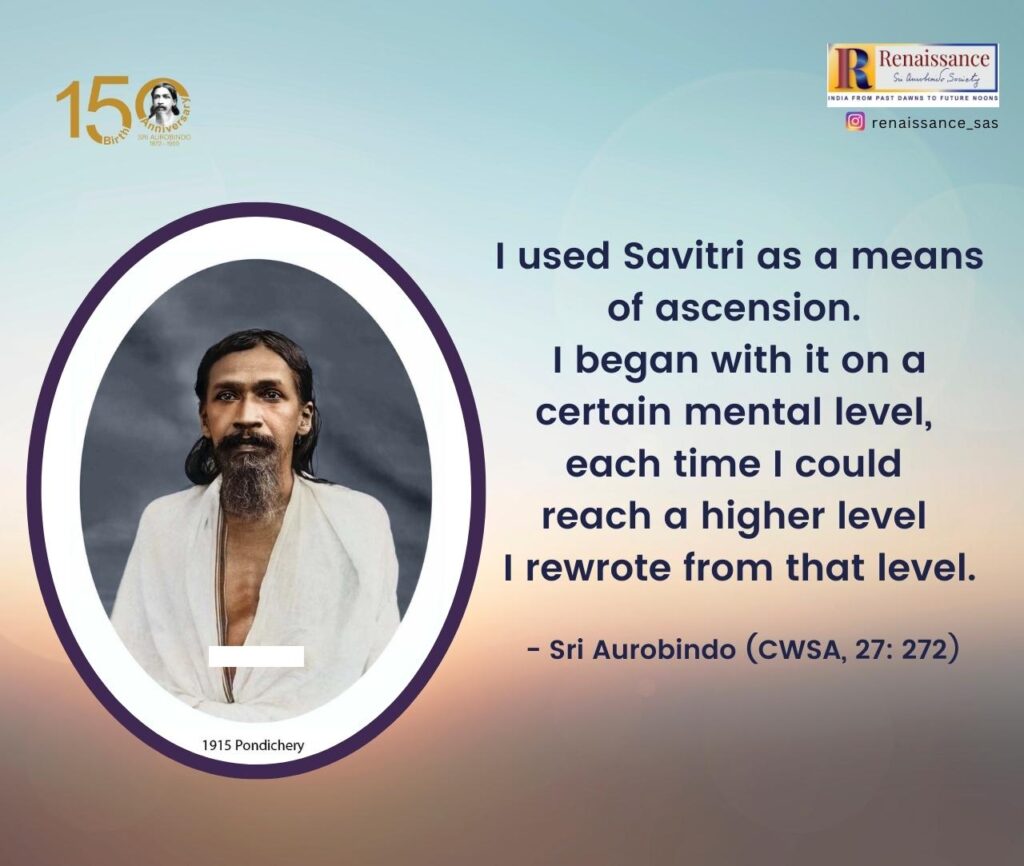
If you pass these tests, then I would say that you could venture to take a plunge into Savitri.
I have recommended these works because I had followed this route. Before you can take up Savitri, you should have acquired the ability to absorb epic poetry in blank verse (unrhymed verse). For Savitri is not just an epic poetry, but mystical-spiritual-Overmind poetry, with the language of symbolism taken to Himalayan heights.
I would be failing in my duty if I do not give you at least a slight taste of what Savitri contains by breaking down some lines and explaining them one by one. On the back cover of Savitri, you would find this extract:
When darkness deepens strangling the earth’s breast
~ CWSA Vol. 33, p. 55
And man’s corporeal mind is the only lamp,
Darkness here means ignorance, also gross materialism. When it becomes overbearing and strangles the life and the heart of man; and man’s corporeal mind is the only lamp…..Corporeal means physical. When man judges everything through his materialistic mind, that becomes his only measure of value with which he sees the world. So, lamp of the corporeal mind means seeing the world through the light of the materialistic mind, gross mind.
As a thief’s in the night shall be the covert tread
~ CWSA Vol. 33, p. 55
Of one who steps unseen into his house
Here Sri Aurobindo is using the imagery of a thief entering someone’s house stealthily in the night; the expression covert tread means hidden and silent footsteps of the thief.
So who is entering the house like this? The Divine itself! When we are blessed by Grace, God enters our life without our knowledge, without our conscious attention, just as a thief enters our house without our knowledge.
A voice ill-heard shall speak, the soul obey,
~ CWSA Vol. 33, p. 55
A Power into mind’s inner chamber steal,
A voice ill-heard shall speak means that the divine voice which we hardly ever hear shall speak and now our soul would obey. A Power into mind’s inner chamber steal implies that the power of the Almighty shall take possession of the innermost recesses of our mind.
A charm and sweetness open life’s closed doors
~ CWSA Vol. 33, p. 55
And beauty conquer the resisting world,
The Truth-Light capture Nature by surprise,
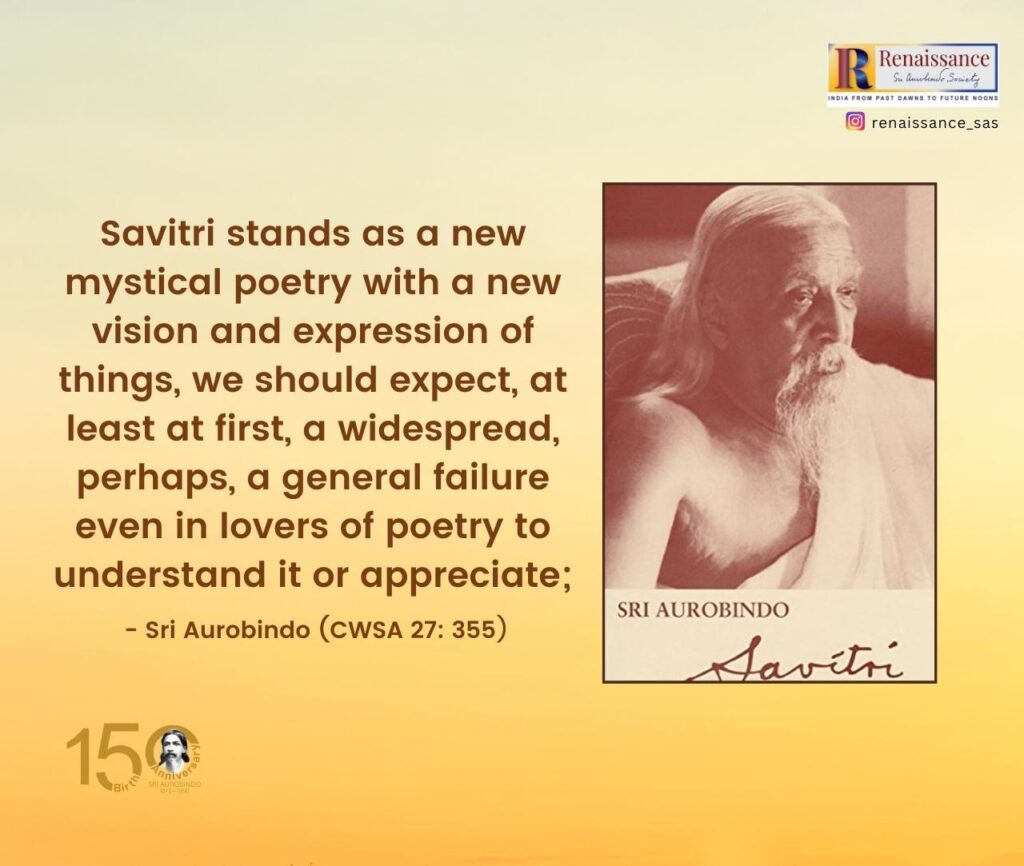
The charm and sweetness and beauty of the Divine shall break through the closed doors of our material and gross life and shall conquer our inner being which usually resists the divine with its earthly, gross and material outlook. The Truth-Light capture Nature by surprise – here Nature means our earthly nature. When Grace descends on us, we are surprised because we cannot fathom what we have done to deserve it.
A stealth of God compel the heart to bliss
~ CWSA Vol. 33, p. 55
And earth grow unexpectedly divine
A stealth of God compel the heart to bliss. . . I feel that there is no other line in any mystical literature of the world to equal this.
A stealth of God means that God is entering our life almost like a thief without our knowledge. And when that happens, naturally, our heart becomes blissful even if we are not willing and are resistant to the divine impulse. What else happens then? And the earth grow unexpectedly divine! This implies that our earth nature takes its turn towards divinity unexpectedly, because it happens of its own accord, due to the grace of the Divine.
Now let us go through the lines once more at one go. Read these lines aloud to feel the force and beauty:
When darkness deepens strangling the earth’s breast
~ Sri Aurobindo, Savitri, CWSA Vol. 33, p. 55
And man’s corporeal mind is the only lamp,
As a thief’s in the night shall be the covert tread
Of one who steps unseen into his house.
A Voice ill-heard shall speak, the soul obey,
A Power into mind’s inner chamber steal,
A charm and sweetness open life’s closed doors
And beauty conquer the resisting world,
The Truth-Light capture Nature by surprise,
A stealth of God compel the heart to bliss
And earth grow unexpectedly divine.
I have only one word for it: sublime. Comparing the unexpected entry of grace into our lives with the thief who enters our home at night without our knowledge. The poetic imagery, the metaphor — everything is simply awesome!
With this small taste of what the poetry of Savitri is like, you may feel the prompting to explore it more. So, make the effort. And pray for Gurukripa to illumine your mind to absorb the knowledge and wisdom that Savitri contains. And the doors of experience would open for you, with your aspiration and with the Grace of the Divine.
Concluded

About the author:
For more than three decades Narendra Murty’s deep passion has been the study of various religions and philosophies — both Eastern and Western. He is the author of a book titled ‘Eating His Money – The Antics of a Metaphysical Clown‘, which comprises of his commentaries on twenty-five stories of Mulla Nasrudin, the enigmatic clown, which is actually a teaching method devised by Sufi masters. Retired from a senior management position, Narendra Murty is presently a full time volunteer with the AuroLeadership project of Sri Aurobindo Society and is also working on his second book ‘Is The Internet Making Us Stupid?’ which is a collection of essays on psychological, social and cultural themes.
Read PART 1

~ Design: Raamkumar

